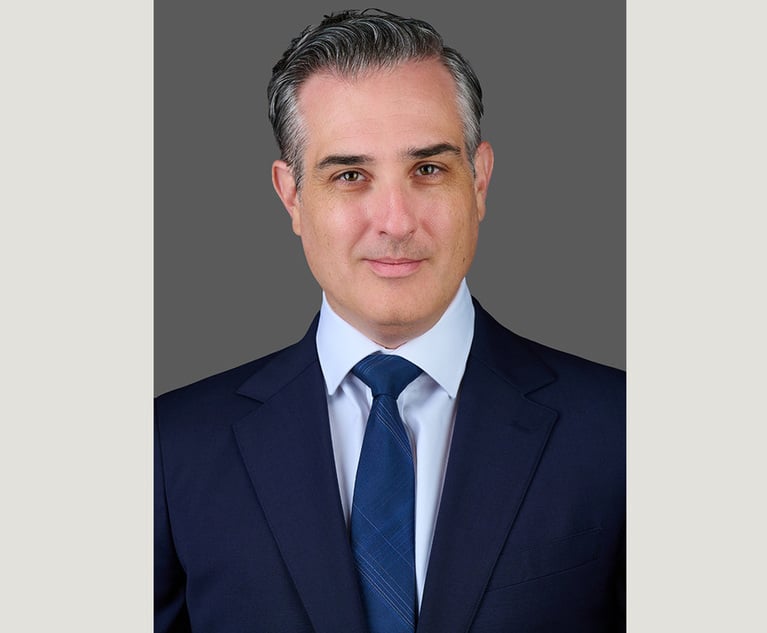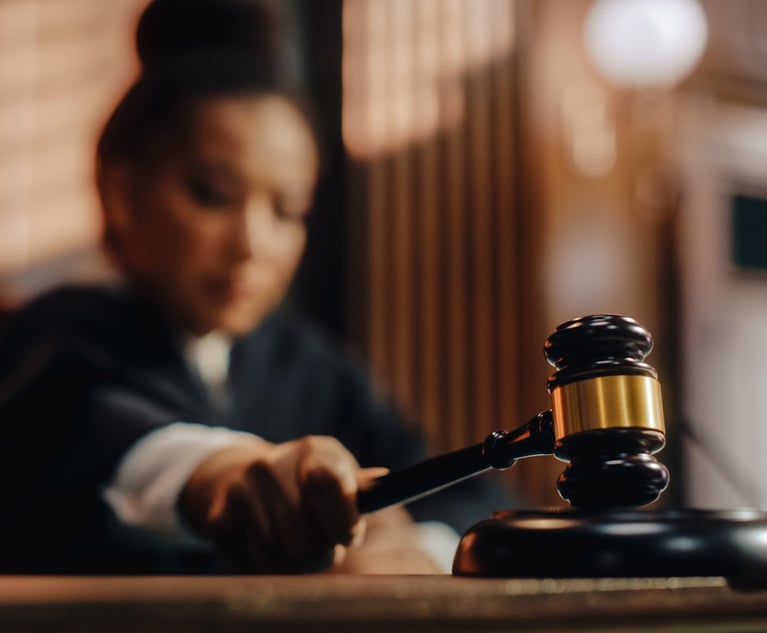Limit on Whistleblower Damages Mandated by Pa.'s Sovereign Immunity, Gov't Lawyers Argue
Barring whistleblowers from recovering noneconomic damages against their former employers might be "distasteful," but it is inherent in sovereign immunity, a lawyer representing the Pennsylvania Turnpike argued before the state Supreme Court on Wednesday.
November 29, 2017 at 03:28 PM
7 minute read
 Getty Images/iStockphoto
Getty Images/iStockphoto Barring whistleblowers from recovering noneconomic damages against their former employers might be “distasteful,” but it is inherent in sovereign immunity, a lawyer representing the Pennsylvania Turnpike argued before the state Supreme Court on Wednesday.
Duane Morris attorney Robert Palumbos told the court that because whistleblower damages are recoverable only through a waiver of sovereign immunity, the scope of those damages must be narrowly construed. Palumbos said the Commonwealth Court's decision to award plaintiff Ralph Bailets more than $1.5 million in mental anguish and humiliation damages in connection with his whistleblower lawsuit far exceeded what is allowed under the law.
“This case shows the dangers of having waivers of governmental immunity extended as far as the Commonwealth Court found,” Palumbos said.
Bailets' case resulted in a $3.2 million verdict against the turnpike, with $1.6 million each in economic and noneconomic damages. But, along with the award came a pronouncement by Commonwealth Court Judge Rochelle Friedman that “actual damages” in whistleblower cases “must include compensation for the mental anguish, humiliation and reputation damage.”
Palumbos told the justices that the issue came down to statutory construction, and, given that the damages were derived from a waiver of sovereign immunity, a strict interpretation must apply.
“Any waiver of sovereign immunity must be unequivocal and specific,” he said, listing other statutes, like the state's Human Relations Act, which specifically state the types of damage that can be recovered. “All that language would be surplusage.”
Justice Max Baer, however, questioned whether the legislature's use of the broad term “actual damages” in the whistleblower law didn't indicate they wanted the damages to be applied broadly, given the law's purpose of fighting government waste and corruption.
“Here your client got caught with its pants down,” he said. “The legislature knew exactly what it was doing when it put actual damages in there uncapped because of the special circumstances.”
Palumbos said that might be a good policy concern, but the court should not reach that issue, given that the law should be viewed using the limited statutory construction interpretation required when viewing laws involving sovereign immunity.
Arguing for Bailets was Thomas Sprague of Sprague and Sprague, and he told the justices the Commonwealth Court's interpretation of the law was correct.
“This is a broad remedial statute requiring a liberal interpretation,” he said. “Why? Because it is to promote whistleblowers, and to promote the reporting of significant waste and wrongdoing.”
Sprague noted that the law does not only apply to government agencies, but it also applies to any entity that takes state money. So any normal limitations due to sovereign immunity waivers should not apply, he told the court.
“The standard rules of statutory construction apply,” Sprague said. “You look to the context in which the words were written. What was the mischief to be remedied, the object to be obtained?”
 Getty Images/iStockphoto
Getty Images/iStockphoto Barring whistleblowers from recovering noneconomic damages against their former employers might be “distasteful,” but it is inherent in sovereign immunity, a lawyer representing the Pennsylvania Turnpike argued before the state Supreme Court on Wednesday.
“This case shows the dangers of having waivers of governmental immunity extended as far as the Commonwealth Court found,” Palumbos said.
Bailets' case resulted in a $3.2 million verdict against the turnpike, with $1.6 million each in economic and noneconomic damages. But, along with the award came a pronouncement by Commonwealth Court Judge Rochelle Friedman that “actual damages” in whistleblower cases “must include compensation for the mental anguish, humiliation and reputation damage.”
Palumbos told the justices that the issue came down to statutory construction, and, given that the damages were derived from a waiver of sovereign immunity, a strict interpretation must apply.
“Any waiver of sovereign immunity must be unequivocal and specific,” he said, listing other statutes, like the state's Human Relations Act, which specifically state the types of damage that can be recovered. “All that language would be surplusage.”
Justice
“Here your client got caught with its pants down,” he said. “The legislature knew exactly what it was doing when it put actual damages in there uncapped because of the special circumstances.”
Palumbos said that might be a good policy concern, but the court should not reach that issue, given that the law should be viewed using the limited statutory construction interpretation required when viewing laws involving sovereign immunity.
Arguing for Bailets was Thomas Sprague of Sprague and Sprague, and he told the justices the Commonwealth Court's interpretation of the law was correct.
“This is a broad remedial statute requiring a liberal interpretation,” he said. “Why? Because it is to promote whistleblowers, and to promote the reporting of significant waste and wrongdoing.”
Sprague noted that the law does not only apply to government agencies, but it also applies to any entity that takes state money. So any normal limitations due to sovereign immunity waivers should not apply, he told the court.
“The standard rules of statutory construction apply,” Sprague said. “You look to the context in which the words were written. What was the mischief to be remedied, the object to be obtained?”
This content has been archived. It is available through our partners, LexisNexis® and Bloomberg Law.
To view this content, please continue to their sites.
Not a Lexis Subscriber?
Subscribe Now
Not a Bloomberg Law Subscriber?
Subscribe Now
NOT FOR REPRINT
© 2025 ALM Global, LLC, All Rights Reserved. Request academic re-use from www.copyright.com. All other uses, submit a request to [email protected]. For more information visit Asset & Logo Licensing.
You Might Like
View All
People in the News—Jan. 9, 2025—Rawle & Henderson, Armstrong Teasdale
3 minute read


Phila. Court System Pushed to Adapt as Justices Greenlight Changes to Pa.'s Civil Jury Selection Rules
5 minute readTrending Stories
- 1Meta Hires Litigation Strategy Chief, Tapping King & Spalding Partner Who Was Senior DOJ Official in First Trump Term
- 2Courts Beginning to Set Standards for Evidence Relying upon Artificial Intelligence
- 3First-Degree Murder Charge May Not Fit Mangione Case
- 4Legal Tech's Predictions for Legal Ops & In-House in 2025
- 5SDNY US Attorney Damian Williams Lands at Paul Weiss
Who Got The Work
Michael G. Bongiorno, Andrew Scott Dulberg and Elizabeth E. Driscoll from Wilmer Cutler Pickering Hale and Dorr have stepped in to represent Symbotic Inc., an A.I.-enabled technology platform that focuses on increasing supply chain efficiency, and other defendants in a pending shareholder derivative lawsuit. The case, filed Oct. 2 in Massachusetts District Court by the Brown Law Firm on behalf of Stephen Austen, accuses certain officers and directors of misleading investors in regard to Symbotic's potential for margin growth by failing to disclose that the company was not equipped to timely deploy its systems or manage expenses through project delays. The case, assigned to U.S. District Judge Nathaniel M. Gorton, is 1:24-cv-12522, Austen v. Cohen et al.
Who Got The Work
Edmund Polubinski and Marie Killmond of Davis Polk & Wardwell have entered appearances for data platform software development company MongoDB and other defendants in a pending shareholder derivative lawsuit. The action, filed Oct. 7 in New York Southern District Court by the Brown Law Firm, accuses the company's directors and/or officers of falsely expressing confidence in the company’s restructuring of its sales incentive plan and downplaying the severity of decreases in its upfront commitments. The case is 1:24-cv-07594, Roy v. Ittycheria et al.
Who Got The Work
Amy O. Bruchs and Kurt F. Ellison of Michael Best & Friedrich have entered appearances for Epic Systems Corp. in a pending employment discrimination lawsuit. The suit was filed Sept. 7 in Wisconsin Western District Court by Levine Eisberner LLC and Siri & Glimstad on behalf of a project manager who claims that he was wrongfully terminated after applying for a religious exemption to the defendant's COVID-19 vaccine mandate. The case, assigned to U.S. Magistrate Judge Anita Marie Boor, is 3:24-cv-00630, Secker, Nathan v. Epic Systems Corporation.
Who Got The Work
David X. Sullivan, Thomas J. Finn and Gregory A. Hall from McCarter & English have entered appearances for Sunrun Installation Services in a pending civil rights lawsuit. The complaint was filed Sept. 4 in Connecticut District Court by attorney Robert M. Berke on behalf of former employee George Edward Steins, who was arrested and charged with employing an unregistered home improvement salesperson. The complaint alleges that had Sunrun informed the Connecticut Department of Consumer Protection that the plaintiff's employment had ended in 2017 and that he no longer held Sunrun's home improvement contractor license, he would not have been hit with charges, which were dismissed in May 2024. The case, assigned to U.S. District Judge Jeffrey A. Meyer, is 3:24-cv-01423, Steins v. Sunrun, Inc. et al.
Who Got The Work
Greenberg Traurig shareholder Joshua L. Raskin has entered an appearance for boohoo.com UK Ltd. in a pending patent infringement lawsuit. The suit, filed Sept. 3 in Texas Eastern District Court by Rozier Hardt McDonough on behalf of Alto Dynamics, asserts five patents related to an online shopping platform. The case, assigned to U.S. District Judge Rodney Gilstrap, is 2:24-cv-00719, Alto Dynamics, LLC v. boohoo.com UK Limited.
Featured Firms
Law Offices of Gary Martin Hays & Associates, P.C.
(470) 294-1674
Law Offices of Mark E. Salomone
(857) 444-6468
Smith & Hassler
(713) 739-1250





